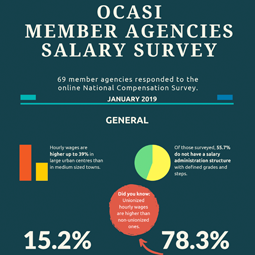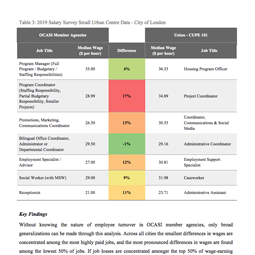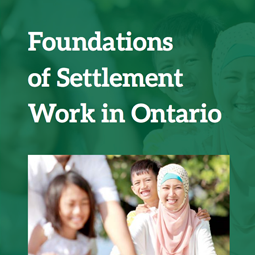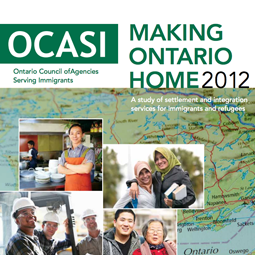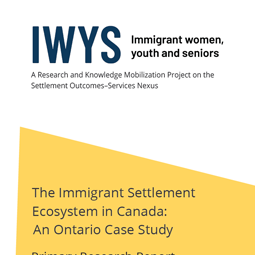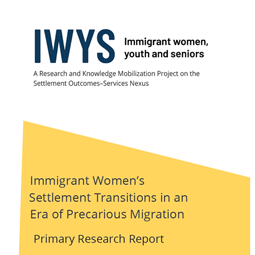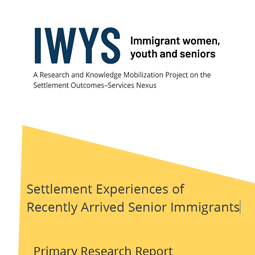OCASI Surveys for Management & Frontline Workers - Member Crisis Responses
The COVID-19 pandemic is impacting us all, and agencies are continuing to make decisions quickly to respond to the ever-changing environment. Indeed, each crisis provides an opportunity for organizational learning to occur and plans to be revised, and it is important to perform an analysis on the resilience of the Immigrant and Refugee-serving sector and its current state of preparedness.
OCASI has developed two comprehensive surveys to capture the perspective of Management and of Frontline Workers during this difficult time that has required so much adaptability.
The Member Crisis Response Survey for Management aims to document the rapid actions employers in the sector have taken and how they are currently positioned to function moving forward, in contrast to the initial months of COVID-19.
The Crisis Response Survey is for Frontline Workers aims to document the rapid actions staff in the sector have taken to continue to efficiently serve their clients. We will also assess how frontline workers are currently positioned to function moving forward, in contrast to the initial months of COVID-19.
On one hand, the data collected from these surveys will analyze how work protocols and best practices have evolved over time, and on the other hand, the data collected will allow us to analyze how the implemented work protocols and practices have affected staff.
Overall it will help to understand the ongoing concerns and difficulties of those for organizations and on the frontlines.
The final report will capture what we have been learning, exploring and managing differently in order to prepare for a potential second wave or future crisis.
Please access the Management survey.
Please access the frontline worker survey.
Please complete the survey by Friday, August 14th, 2020.
For more information, please contact Manolli Ekra, Senior Coordinator, Policy and Research mekra@ocasi.org.
Thank you for completing the questionnaires.
1) OCASI involvement
Building Migrant Resilience in Cities
 OCASI is part of the Board of Building Migrant Resilience in Cities-Immigration et Résilience en milieu urbain (BMRC-IRMU) along with others partners from academia, nonprofits and government. The BMRC-IRMU is an opportunity to deepen the links among partners across Quebec and Ontario and create new synergies that benefit from each sector’s distinct knowledge and expertise. The goal is to nurture a multidisciplinary partnership that will create and disseminate original and relevant knowledge about migration and settlement to researchers, policymakers and decision- makers throughout Canada and around the world at the time they need it.
OCASI is part of the Board of Building Migrant Resilience in Cities-Immigration et Résilience en milieu urbain (BMRC-IRMU) along with others partners from academia, nonprofits and government. The BMRC-IRMU is an opportunity to deepen the links among partners across Quebec and Ontario and create new synergies that benefit from each sector’s distinct knowledge and expertise. The goal is to nurture a multidisciplinary partnership that will create and disseminate original and relevant knowledge about migration and settlement to researchers, policymakers and decision- makers throughout Canada and around the world at the time they need it.
Data Policy Coalition "Ontario data strategy consultation"
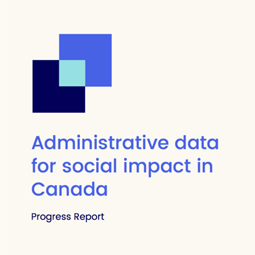 OCASI is part of the Data Policy Coalition composed of more than 30 nonprofit organizations, representing service providers, advocacy groups, and funders within the nonprofit sector. The goal is to enhance the nonprofit sector’s access and responsibility, ethical use of government-held administrative data to improve social service delivery, impact evaluation, and evidence-based planning for public benefit.
OCASI is part of the Data Policy Coalition composed of more than 30 nonprofit organizations, representing service providers, advocacy groups, and funders within the nonprofit sector. The goal is to enhance the nonprofit sector’s access and responsibility, ethical use of government-held administrative data to improve social service delivery, impact evaluation, and evidence-based planning for public benefit.
Youth Sexual Health needs in Middle Eastern and North African (YSMENA)
OCASI is a community partner in The Exploring Youth Sexual health needs in Middle eastern and North African Region – A Planning & Dissemination Initiative to address barriers in HIV prevention (YSMENA). This research study aims to raise the visibility of the sexual needs and barriers to care faced by young people from the MENA region living in Canada.
Canadian Syrian Lived Experience Project
OCASI is a community partner in the Canadian Syrian Lived Experience Project. The overall purpose of this research is to generate new insights into the lived experience of Syrian refugees who arrived in Canada in 2015-16, which can provide direct benefits in terms of guiding policy and settlement programming, building capacity for further research, and improving the public narrative around Syrian refugees in Canada.
2) OCASI research
3) Research catching our attention
How to Evaluate integration? The Home Office Indicators of Integration framework 2019
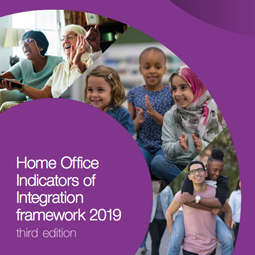 The UK office has developed the Indicators of Integration framework with different stakeholders (academics, non-governmental organizations and local service providers, local and national governments, migrants themselves). This report aims to provide guidance and tools to identify and measure the key factors that contribute to integration – in its multiple meanings and context- and thereby help organizations design more effective strategies. This framework is intended to be a resource for integration practitioners at all levels, offering a common language for understanding, planning, monitoring and measuring integration, and supporting better and more tailored integration services.
The UK office has developed the Indicators of Integration framework with different stakeholders (academics, non-governmental organizations and local service providers, local and national governments, migrants themselves). This report aims to provide guidance and tools to identify and measure the key factors that contribute to integration – in its multiple meanings and context- and thereby help organizations design more effective strategies. This framework is intended to be a resource for integration practitioners at all levels, offering a common language for understanding, planning, monitoring and measuring integration, and supporting better and more tailored integration services.
Visit indicators framework webpage
How to visualize diversity in Canada?
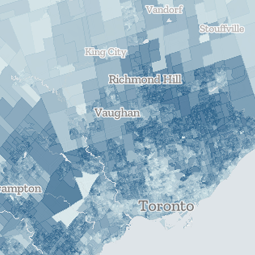 Daniel Hiebert from University of British Columbia presented few weeks ago in Toronto one of his latest research and introduced a new website: the "superdiversity in Canadian cities". The goal is to build a website to illustrate migration and diversity data to help visualization of layers of superdiversity but also to provide people with tools to tell their own stories. After Vancouver, Toronto is the second Canadian city added on this new platform. The website uses data from the census but also from IRCC (administrative data and in the coming months, icare).
Daniel Hiebert from University of British Columbia presented few weeks ago in Toronto one of his latest research and introduced a new website: the "superdiversity in Canadian cities". The goal is to build a website to illustrate migration and diversity data to help visualization of layers of superdiversity but also to provide people with tools to tell their own stories. After Vancouver, Toronto is the second Canadian city added on this new platform. The website uses data from the census but also from IRCC (administrative data and in the coming months, icare).
Take the time to play around on this innovative and rich website.
Go to www.superdiv-canada.mmg.mpg.de
The competencies of frontline settlement counsellors in Canada
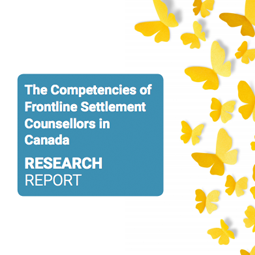 This CERIC-funded project was conceived as a contribution toward building the capacity of frontline settlement workers, on whom much of the responsibility for assisting newcomers ultimately falls. Hence, this project focused on the functional role of the settlement counsellors as it is a challenging role that connects to all functional areas. This project first aims to gain insight into the work of settlement counsellors and to outline the career path of this position. The second aim is to identify key competencies that can form the foundation for effective and affordable training. The project seeks to contribute to a rich and growing body of knowledge used by settlement agencies to raise the profile of settlement counsellors; to help identify potential candidates; to provide initial and ongoing training with greater effectiveness and affordability; and to ensure talent is well nurtured. While the focus of this project is on the role of settlement counsellors, many of the insights, conclusions and recommendations can be applied to others.
This CERIC-funded project was conceived as a contribution toward building the capacity of frontline settlement workers, on whom much of the responsibility for assisting newcomers ultimately falls. Hence, this project focused on the functional role of the settlement counsellors as it is a challenging role that connects to all functional areas. This project first aims to gain insight into the work of settlement counsellors and to outline the career path of this position. The second aim is to identify key competencies that can form the foundation for effective and affordable training. The project seeks to contribute to a rich and growing body of knowledge used by settlement agencies to raise the profile of settlement counsellors; to help identify potential candidates; to provide initial and ongoing training with greater effectiveness and affordability; and to ensure talent is well nurtured. While the focus of this project is on the role of settlement counsellors, many of the insights, conclusions and recommendations can be applied to others.
The Immigrant Women, Youth, and Seniors (IWYS) project
The Immigrant Women, Youth, and Seniors (IWYS) project has released four primary research reports. With a focus on Ontario, the reports analyze settlement services and outcomes for these three migrant groups with multiple vulnerabilities. You can view and download the reports at this link: ceris.ca/iwys-primary-research-reports
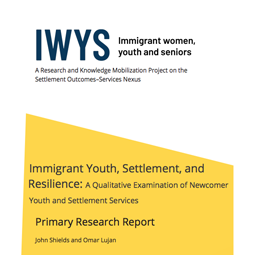
Immigrant Youth, Settlement, and Resilience: A Qualitative Examination of Newcomer Youth and Settlement Services
Temporary foreign workers in the Canadian labour force
 This Economic Insights article compares the labour force participation of temporary foreign workers with open work permits and employer-specific work permits in terms of their level of labour market engagement in Canada, their distribution by province and industry, and the duration of temporary residence status and rate of transition to permanent residency.
This Economic Insights article compares the labour force participation of temporary foreign workers with open work permits and employer-specific work permits in terms of their level of labour market engagement in Canada, their distribution by province and industry, and the duration of temporary residence status and rate of transition to permanent residency.

